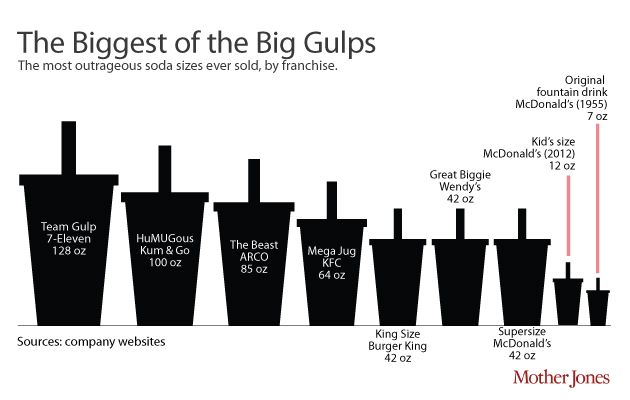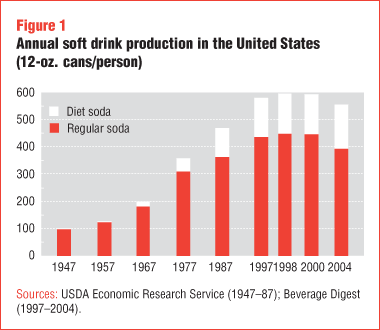
Mother Jones: Click Here
Americans appear to be losing the fight against excess weight. The trends have been generally upward since the 1970s–with spikes in the 1980s and 1990s– although they appear to have leveled off. The complexity of nutrition and weight gain is astounding and there are many theories, along with many diets, all too often presented as absolute fact. But science does not have this nailed down. So it is possible to sympathize with the American Beverage Association who have had to defend its sugar-sweetened beverages from attacks.
In a press release on ABA’s website posted September 21, 2012, Click Here, they claim that:
- while it is true that Americans consume more calories then they did in 1970, almost all are from sources other than beverages.
- sugar-sweetened beverages contribute about 7 percent of the calories in the average American’s diet.
- caloric intake from sugar-sweetened beverages declined by more than 20 percent between 2001 and 2010, yet obesity rates continued to rise
- The average number of calories per beverage serving is down 23 percent since 1998
- forty-eight percent of overweight and obese individuals drink no sugar-sweetened beverages.
Of course, a press release does not have to show where the numbers came from or verify their accuracy. To do that, we would need to go to other sources or to make some judgments.
I recognize the desire to simplify statistics, but averages can be very misleading. If they are correct in saying that almost half of the people categorized as overweight or obese are not drinking sugar-sweetened beverages, than what does 7 percent actually mean? Does it mean that some people are getting 14 or 20 or 30 percent of their calories from soda, while others consume zero?
I assume they know the amount of sugar in the drinks and can honestly report a decline in the last decade. What is interesting, however, is that as the calories per serving declined, we have seen a leveling off of the percentage of people with excess weight. So, the circumstantial data does not look so good for the soda manufacturers. But as researchers, we know not to jump to causal conclusions based on trend data. Many other factors are happening at the same time and trend data does not account for them.
As researchers, we would want more solid information about causality. So, while the question is simple: “Does soda make people fat?”, the answer is not as solid as the advocates would like. That should not be a surprise. The bio-chemical processes about metabolism are not fully understood and appear to vary for people. Nor is explaining weight gain as simple as saying “calories are calories” and people gain weight because they simply consume more calories than they burn. Nope. It is more complex.
Still, soda has become the symbol for a lot that is wrong with the American diet. Maybe because it is easy to chart–I love the Mother Jones chart. Or maybe there is something about sugar-sweetened beverages that is about more than excess calories. At a talk I attend by Dr. Marks, an Endocrinologist from OHSU, I learned that fructose (whether in the form of high fructose corn syrup or sugar) does not get registered as calories by the body–or more specifically, fructose does not signal the body that it just took in calories Researchers have noted that people who drink soda tend to also eat more calories, perhaps because it does not signal the total amount of energy that is being consumed.
What do we know from science? Stay tuned
